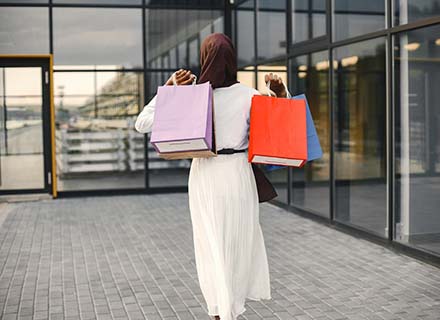In the Global Retail Development Index, Saudi Arabia has gone up nine spots to third position thanks to a growth in non-cash transactions.
The retail potential of 35 to 40 emerging nations is determined by the GRDI using a broad range of factors, such as consumer affluence, regulatory framework, and economic health, according to a release.
The US consultancy firm’s 2023 edition of the biannual survey results reflect the growing trend of global retail development in the region of Middle East and North Africa (MENA).
They also solidify the nation’s strategic turn away from its reliance on oil, which now contributes around 40% of its GDP and the creation of an environment that is conducive to business.
“The next wave of growth in retail is being driven by the MENA region, particularly the Kingdom of Saudi Arabia,” stated Debashish Mukherjee, partner at Kearney Middle East and Africa and lead for the company’s consumer and retail practice.
“These markets are redefining the retail ecosystem with strategic digital adoption and consumer-centric approaches, as demonstrated by the 2023 GRDI,” Mukherjee continued further.
Mukherjee emphasised further that the increase in this year’s GRDI is a definite sign of the country’s vibrant retail scene and its deliberate efforts to support a varied and competitive economic environment.
The research also stated that the Kingdom’s rise in the index was due to a surge in non-cash retail transactions, which increased from 16% in 2016 to 62% in 2022 with a target of 70% by 2030.
The country’s expansion in the employment of Saudi citizens in high-skilled jobs and doubling of female labour participation, surpassing “Vision 2030” expectations, was another factor contributing to the increase.
In addition, the Kingdom’s rise in the index was facilitated by the notable rise in investment transactions and licenses in 2022, as well as the expanding acceptance and popularity of buy now pay later services.
Additional factors included the introduction of foreign brands, the growth of the entertainment and lifestyle industries, and the integration of digital and artificial intelligence into the Saudi consumer market.
Retailers wishing to negotiate the challenges and seize the opportunities in these developing countries should use the GRDI as a guide.
As per Majed Al-Hogail, the minister of municipal and rural affairs and housing, Saudi Arabia’s retail sector is contributing 23% to the non-oil economy, and is aiming to exceed SR460 billion (USD 122.6 billion) by 2024 end.
Noting the pivotal role of the sector in realising the Kingdom’s economic diversification agenda, Al-Hogail, during the “10th Retail Leaders Circle MENA Summit” in Riyadh stated, “In our plans for the retail sector, we focused on restaurants, cafes, entertainment, and public areas. We worked on developing legislation, regulations, and requirements through fruitful integration and effective partnership with the private sector.”
The occupancy rates in the retail sector in Riyadh and Jeddah reached 88% in 2023, and efforts had resulted in issuing “no fewer than 70,000 licenses” annually for the sector, the minister noted further.
Setting localisation of the retail sector jobs as the top priority, Al-Hogail stated, “We are working to provide diverse employment opportunities. We are working to incentivise private sector establishments and provide an attractive environment for Saudis to work.”

